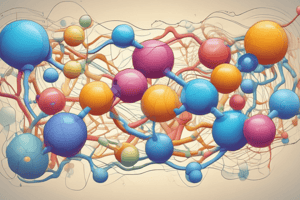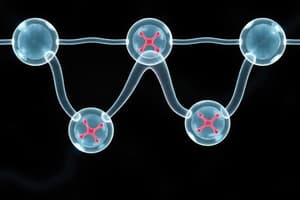Podcast
Questions and Answers
What is the primary function of glycolysis?
What is the primary function of glycolysis?
- To synthesize pyruvate from acetyl CoA
- To produce lactate as an end product
- To convert glucose into glucose-6-phosphate
- To provide energy in the form of ATP (correct)
What are the end products of anaerobic glycolysis?
What are the end products of anaerobic glycolysis?
- 2 Pyruvate
- NADH and 2 ATP
- Acetyl CoA
- Lactate (correct)
In which cellular location does glycolysis occur?
In which cellular location does glycolysis occur?
- Mitochondria
- Endoplasmic reticulum
- Nucleus
- Cytosol (correct)
Which enzyme is key in the regulation of glycolysis?
Which enzyme is key in the regulation of glycolysis?
What happens to pyruvate in aerobic glycolysis?
What happens to pyruvate in aerobic glycolysis?
Study Notes
Introduction
- Glycolysis is the breakdown of glucose
- It occurs in the cytosol of all tissues
- It provides energy in the form of ATP, which is its primary function
- It is essential for many metabolic pathways
- All sugars can be converted to glucose, which can then be metabolized through glycolysis
Glycolysis Overview
- Glycolysis involves a series of 10 steps
- Each step is catalyzed by a specific enzyme
- Two key regulatory enzymes are hexokinase/glucokinase and phosphofructokinase (PFK)
- These enzymes are the rate-limiting steps in glycolysis
Glycolysis Stages
- First Stage: Glucose is converted to glyceraldehyde-3-phosphate (G3P)
- This stage requires energy in the form of ATP and involves phosphorylation reactions
- Two molecules of ATP are used
- Second Stage: G3P is converted to pyruvate
- This stage generates ATP and NADH
- Four molecules of ATP are produced
- Two molecules of NADH are produced
End Products of Glycolysis
- Aerobic Glycolysis: Occurs in the presence of oxygen and mitochondria
- 2 Pyruvate: enters the mitochondria and is converted into acetyl CoA. Acetyl CoA enters the citric acid cycle (Krebs cycle) to yield energy in the form of ATP
- 2 NADH: utilizes mitochondria and oxygen to yield energy
- Anaerobic Glycolysis: Occurs in the absence of oxygen or mitochondria
- 2 Lactate: formed from pyruvate (by utilizing NADH)
- This serves as a means to regenerate NAD+ for continued glycolysis in the absence of oxygen
Energy Yield from Glycolysis
- Anaerobic Glycolysis:
- Yields 2 ATP per glucose molecule
- Aerobic Glycolysis:
- Yields 2 ATP per glucose molecule
- 2 NADH per glucose molecule
- 2 pyruvate per glucose molecule
- Complete aerobic oxidation of glucose:
- 2 pyruvate are converted to 2 acetyl CoA = 6 ATP
- 2 acetyl CoA enter the citric acid cycle: 2 X 12 = 24 ATP
- Total = 38 ATP per glucose molecule
Regulation of Glycolysis
- Short-Term Regulation:
- Hexokinase/Glucokinase: Inhibited by its product glucose-6-phosphate
- Phosphofructokinase (PFK):
- Inhibited by ATP and citrate
- Activated by AMP, ADP, and fructose-2,6-bisphosphate
- Long-Term Regulation:
- Induction & Repression of enzyme synthesis:
- Insulin: Induces the synthesis of key glycolytic enzymes
- Glucagon: Represses the synthesis of key glycolytic enzymes
- Induction & Repression of enzyme synthesis:
Genetic Defects in Glycolytic Enzymes
- Pyruvate Kinase Deficiency:
- Leads to reduced rate of glycolysis and decreased ATP production
- Can cause hemolytic anemia
Studying That Suits You
Use AI to generate personalized quizzes and flashcards to suit your learning preferences.
Related Documents
Description
This quiz explores the glycolysis process, its stages, and the enzymes involved in the breakdown of glucose. Understand the key regulatory steps and the energy production aspects of glycolysis through a series of questions designed to test your knowledge. Perfect for students studying biochemistry or cellular metabolism.




